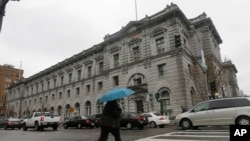A federal appeals court Thursday refused to reinstate President Donald Trump's ban on travelers from seven predominantly Muslim nations.
The three-judge panel from the 9th U.S. Circuit Court of Appeals in San Francisco unanimously declined to block a lower-court ruling that suspended the ban and allowed previously barred travelers to enter the United States.
"We hold that the government has not shown a likelihood of success on the merits of its appeal, nor has it shown that failure to enter a stay would cause irreparable injury," a statement issued by the appeals court panel said.
“See you in court, the security of our nation is at stake,” the president tweeted shortly after the court announced its decision.
Last week, District Judge James Robart in Seattle issued a temporary restraining order halting the ban after the states of Washington and Minnesota sued.
After Robart issued his ruling, President Trump responded angrily on Twitter, calling Robart a “so-called judge” who made a "ridiculous" decision that will allow "many very bad and dangerous people into our country."
During oral arguments Tuesday, the judges heard arguments from a lawyer for the Justice Department and an attorney representing the states of Washington and Minnesota, which sued to overturn the ban.
U.S. attorney August Flentje argued that Trump's executive order was well within his power granted by Congress and the Constitution.
But Washington state Solicitor General Noah Purcell said the travel ban reinstating the travel ban without a full judicial review would throw the country "back into chaos."
He also said the ban had separated families, stranded students overseas, and left people in doubt about whether they should travel because of the uncertainty of whether they could come back.
Washington ruling
Robart temporarily halted the ban after determining that the states were likely to win the case and had shown that the ban would restrict travel by their residents, damage their public universities and reduce their tax base. The judge put the executive order on hold while the lawsuit works its way through the courts.
Soon after his ruling, the State Department said people from the seven countries -- Iran, Iraq, Libya, Somalia, Sudan, Syria and Yemen -- with valid visas could travel to the U.S. The decision led to tearful reunions at airports around the country.
The federal government is now expected to appeal to the Supreme Court.
Trump’s ban was set to expire in 90 days, meaning it could run its course before the high court can take up the issue. The administration also could change the order, including altering its scope or duration.
The president said the order was vital for national security. But critics said the ban discriminated against Muslims, and they questioned its value as a security measure.
National security veterans, major U.S. technology companies and law enforcement officials from more than a dozen states backed the legal effort against the ban.




